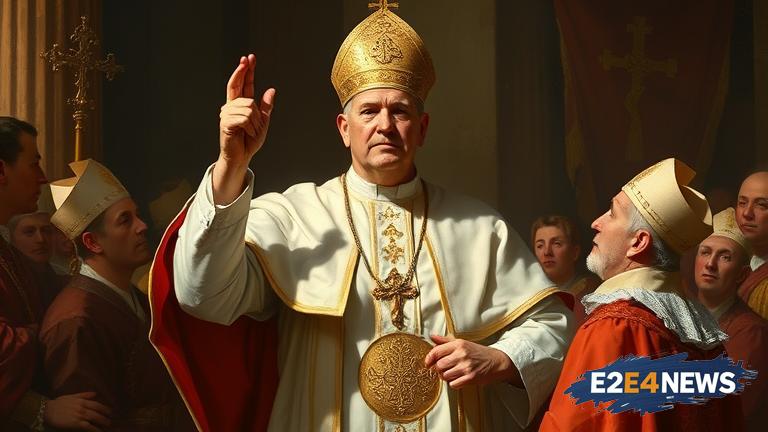The Catholic Church is facing a severe crisis with a significant decline in the number of priests, a situation that has been described as a ‘great misfortune’ by Pope Leo XIV. This shortage has far-reaching implications for the Church’s ability to provide spiritual guidance and sacraments to its faithful. The Pope’s statement emphasizes the gravity of the situation, which has been exacerbated by factors such as declining vocations, aging clergy, and changing societal values. The lack of priests is not only a numerical issue but also a qualitative one, as it affects the Church’s capacity to provide meaningful pastoral care and support to its communities. The Church’s mission to spread the Gospel and serve the faithful is severely hindered by the scarcity of priests, making it challenging to maintain the sacramental life of the Church. The Pope’s warning serves as a call to action for the Church to re-examine its approach to vocations, priestly formation, and pastoral care. It is essential for the Church to foster a culture of vocations, encouraging young men to consider a life of service as priests. Moreover, the Church must also explore innovative ways to support and retain existing priests, ensuring they receive the necessary formation, support, and resources to thrive in their ministry. The decline of priests is a global phenomenon, affecting not only the Catholic Church but also other Christian denominations. The situation is particularly dire in certain regions, where the scarcity of priests has led to the closure of parishes and the consolidation of dioceses. The Church must also address the issue of priestly burnout, which can result from excessive workload and lack of support. Furthermore, the Church should prioritize the formation of priests who are equipped to address the complex spiritual and pastoral needs of modern society. The Pope’s statement highlights the need for a renewed emphasis on prayer, discernment, and vocational promotion. It is crucial for the Church to create an environment that encourages and supports individuals who are considering a vocation to the priesthood. The Church must also engage with the broader society, promoting a culture that values and respects the role of priests and the importance of spiritual leadership. In addition, the Church should explore new models of ministry and collaboration, such as teamwork and shared leadership, to mitigate the effects of the priest shortage. The situation requires a multifaceted approach, involving the cooperation of bishops, priests, religious, and laypeople. The Church must also recognize the importance of technology and social media in promoting vocations and supporting priestly ministry. Ultimately, the decline of priests is a wake-up call for the Church to re-evaluate its priorities and strategies, ensuring that it remains relevant and effective in its mission to serve the faithful. The Pope’s warning serves as a reminder of the urgent need for the Church to address this crisis, and to work towards a future where the sacramental life of the Church can thrive. The situation demands a collective response, involving the entire Church, to promote vocations, support priests, and ensure the continued vitality of the Church’s mission. The Church must also prioritize the formation of lay leaders and the empowerment of the laity, recognizing their essential role in the Church’s mission and ministry. By working together, the Church can address the shortage of priests and ensure that its mission to spread the Gospel and serve the faithful continues to flourish.
